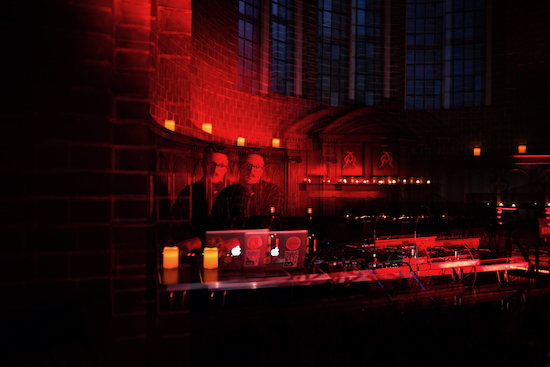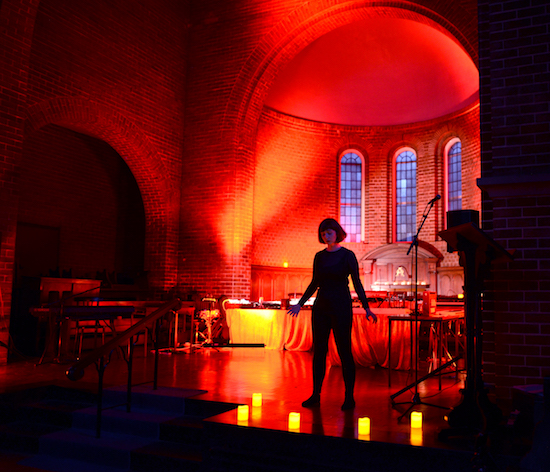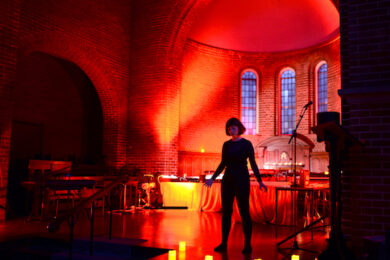Brian Eno once claimed that sleeping through a musician’s set was akin to paying them a compliment. A sound assertion and no mistake. From The Goldberg Variations being commissioned by a Russian diplomat for his boss, Count Kaiserling of Saxony, who suffered from insomnia, to Max Richter having no trouble persuading 400 people to don pyjamas and kip through an eight-hour lullaby in Berlin in 2016, music and sleep are wholly compatible bedfellows. Hosted in the deconsecrated (and allegedly haunted) St. Martin’s church in East Belfast, Framewerk Sleepover adopted this premise to curate an event, running from 8pm to 8am, where performance, a night out and sleep overlap in a soporific blur.
If you arrived just in time to catch the end of this evening’s opening act, you would have had to bypass armoured police vehicles and a closed Newtownards road kowtowing to the Ballymacarrett Defenders Flute Band. Inside the dark and lofty St. Martin’s, no such goading vestige of the province’s more partisan past is to be found. Makeshift camp beds run alongside the left of the nave; lanterns softly flicker at the edge of pews to the right. With the altar cloaked in red, and fashioned with the keyboards and interfaces of tonight’s performers, Dublin-based sound artist Christopher Steenson’s ‘Spectres Of Space’ – a play on Derrida’s Spectres de Marx, featuring samples from cassette recordings of Northern Irish choirs and church services – makes for an apt opening incantation.
While the majority of the 20 acts on tonight’s bill concern themselves with the airing of exploratory sounds, poetry and theatre are introduced to the tabernacle early on. Bursting with cadence and musicality, Paulo Sousa Quase Sósia guides his multi-part concrete poetry performance in Portuguese with clear exegesis in English. Afterwards, representing the city’s Movement Collective, Ro Owens’ solo theatre piece ‘6.5’ makes for some entrancing respite. Soundtracked by Sviatoslav Richter’s take on Beethoven’s Sonata Pathétique, Owens’ subtle, reiterative movements, we later learn, reflect the lack of control one feels when depression creeps in. As the night winds on, and the intermittent crack of an opening can is the closest thing to clamour, figures come and go, every bit as obeisant as they would be of a Sunday morning in mass. Bodies are strewn out on beds; attentive figures perch on the pews, eyes aglaze. With a sleepy head heeded on a shoulder here, and a lonely smile spotted there, highlights are mottled.
The improvised doom psalms (or self-proclaimed "amplified junk") of trio ARC induce interpretative dancing in the darkened aisle via their meld of modified instruments and DIY electronics. The swooning death-pop of Tom Greenhalgh AKA Ruth Bate makes for some stellar Maus-meets-Lynch balladry. Consisting solemn folk paean ‘Across The Blackened Fields’ and some sublime improvised interplay, Alison O’Donnell and David Colohan of United Bible Studies’ liminal drones prove nothing short of epiphanic. Culminating in the pair wandering into the aisle of St. Martin’s, humming an off-the-cuff melody, it doubles up as the night’s supreme moment. But with much of the audience finally submitting to sleep, the full-blown pay-off arrives from the witching hour, courtesy of successive sets from Stuart Watson of Belfast drone-pop septet Documenta, Aileen McKenna AKA This Ship Argo and Chris McCorry. While Watson veers between warm webs of droning majesty and plumes of discordant noise, and McKenna’s blend of understated beats, symphonic synth-lines and vocal samples makes for an outright highlight, McCorry musters Stars Of The Lid-esque levels of room-swallowing ambience via 12-string electric guitar, two guitar amps, a loop pedal and tape delay. Though it was scarcely in doubt throughout the night, that the BBC have regularly recorded sound on the same altar in which McCorry plays should come as no surprise.

In Eno’s aforementioned estimation, compliments then start to be paid. Stood upon a rickety pulpit, gospel-side, Richard Bailie’s installation Constellation is a final vivid peak. Generating a feedback loop via an audio-call, and utilising decay, FM radio transmissions and the natural reverb of the room, Bailie invites those still awake to participate by joining the call on their phone. An audience member or two obliges; their words are warped out of shape and an unknown classical performance from a radio broadcast steadily fills the room. And then sleep.
Testament to the occasion, if only for two hours, it feels safe to drift off. And though staying conscious enough to note the particulars of the final acts is forsaken in the process, accepting the entreaty of nod just before 6am feels right. There are some semi-conscious flickers after the fact: the muted balm of Richard Davis AKA Heliopause’s minimal piano and vocals (he would later post on Instagram that “singing to a sleeping crowd was a dream”); briefly stirring to see the aisle full of quiet, zoned-out bodies doing yoga in an otherwise normal overcast Belfast Sunday morning; being gently prodded by a stranger to my right and told that it was “time to go” at 8.15am. As I hop in a taxi with said gentle prodder and a friend, the driver asks, “Well, what went on in there last night?” A glance in the mirror of total bemusement. A reluctance to fully understand. Never mind, I think, he’s bringing me home and it’s there where last night can continue.



